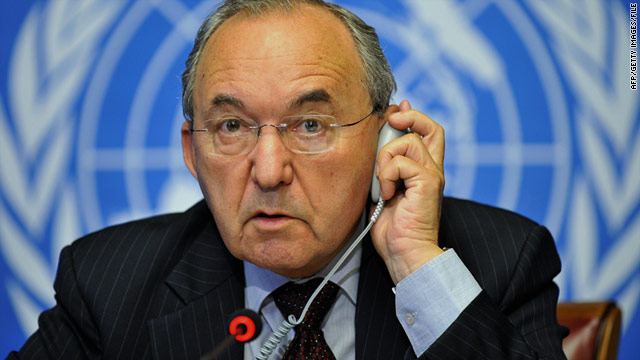Impunity Watch Reporter, Middle East
JERUSALEM, Israel – Richard Goldstone, author of the infamous “Goldstone Report” condemning Israel for committing war crimes during its 2008-2009 offensive against Hamas, told news agencies Saturday that the study’s findings may be inaccurate. New investigations conducted by the Israeli government into alleged violations of international law by members of the Israeli Defense Force (IDF) challenge the report’s conclusions that indiscriminate and disproportionate use of force by the IDF was a part of a state sanctioned policy of retribution. Commenting on the findings of Israel’s investigation, Goldstone announced “If I had known what I know now, the Goldstone Report would have been a different document.

In 2009, Goldstone was appointed chairman of a U.N fact-finding mission created by the U.N. Human Rights Council (UNHRC) to investigate alleged violations of human rights and humanitarian law by Israel. The 575 page report documented various counterinsurgency strategies and detention methods and concluded that Israel had committed “actions amounting to war crimes.”
Despite quick endorsement of the report by the UNHRC, Israel strongly rejected the findings as unsubstantiated and biased against the Jewish state. Now Israel is calling for the U.N. to formally cancel the findings of the report. Prime Minister Benjamin Netanyahu welcomed Goldstone’s retraction noting “[t]he fact that Goldstone backtracked must lead to the shelving of this report once and for all.” Sami Abu Zuhri, spokesperson for Hamas, however, demanded the implementation of the report despite Goldstone’s reservations.
Goldstone explained that the study’s conclusions may have been affected by Israel’s initial lack of cooperation with the UN investigation. The lack of cooperation between the investigative body and the government of Israel made it difficult contends Goldstone, to verify U.N. data and contextualize the use of specific uses of force. Goldstone further noted that since the publication of the report, Israel has taken steps to limit the use of dangerous weapons, like white phosphorus, in civilian areas.
While the evidence provided by the government of Israel suggests that certain individual members of the military may in fact be guilty of misconduct, there is no indication that the government deliberately targeted civilians for attack and detention. Government officials assured the international community that those individually responsible for violations of international law would be brought to justice but expressed that the damage from the report “has already been done.”
For more information please see:
Jerusalem Post – Moshe Ya’alon Urges UN to Retract Goldstone Report – Apr. 3, 2011
Jewish Telegraph Agency – Israel Launching Drive to Void Goldstone Report – Apr. 3, 2011
Ynet.com – Soldiers: Goldstone Damage Already Done – Apr. 3, 2011
CNN World News – Author of Israel-Hamas Report: Would Reconsider Findings – Apr. 2, 2011


